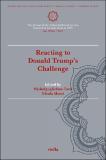Files in this item
Myanmar 2018 : botched transition and repatriation plan
Item metadata
| dc.contributor.author | Fumagalli, Matteo | |
| dc.date.accessioned | 2019-10-04T08:30:03Z | |
| dc.date.available | 2019-10-04T08:30:03Z | |
| dc.date.issued | 2019-07-25 | |
| dc.identifier | 257677614 | |
| dc.identifier | 3aafd1f8-8be2-415e-afe6-315b38978e94 | |
| dc.identifier.citation | Fumagalli , M 2019 , ' Myanmar 2018 : botched transition and repatriation plan ' , Asia Maior , vol. XXIX , pp. 233-246 . < https://www.viella.it/rivista/9788833132419 > | en |
| dc.identifier.issn | 2385-2526 | |
| dc.identifier.other | ORCID: /0000-0002-1451-2088/work/60195962 | |
| dc.identifier.uri | https://hdl.handle.net/10023/18607 | |
| dc.description.abstract | The year was defined by the Rohingya crisis, which lingers on and remains unresolved. The agreement signed by the governments of Myanmar and Bangladesh in November 2017 had several aborted starts in 2018. Both governments came under the pressure of China to deal with the repatriation of the Rohingya refugees bilaterally, without the involvement of other (international) parties. What was evidently a forced repatriation plan was eventually halted in November. The outcry of human rights and refugee organisations continued unabated, as did western outrage against State Counsellor Aung San Suu Kyi, widely seen as callous and complicit in the military’s atrocities against the Rohingya. As ties with the United States worsened, China’s economic clout in Myanmar was consolidated, as evidenced by the expansion of economic projects and Beijing’s leverage on Nay Pyi Taw during the crisis. At home, however, Suu Kyi remained personally popular. Despite some efforts at rebooting, her government’s performance has oscillated between ineptitude and incompetence. Some personnel reshuffles and new strategic plans notwithstanding, its shortcomings remain well-known, being plagued by personalisation, the centralisation of decision-making and over-reliance on loyalty, to the detriment of expertise and professionalism. The NLD’s cohabitation with the military has continued, but no open rifts have thus far surfaced. | |
| dc.format.extent | 14 | |
| dc.format.extent | 6999684 | |
| dc.language.iso | eng | |
| dc.relation.ispartof | Asia Maior | en |
| dc.subject | Myanmar | en |
| dc.subject | Transition | en |
| dc.subject | Repatriation | en |
| dc.subject | Bangladesh | en |
| dc.subject | Aung Saan Suu Kyi | en |
| dc.subject | Rohingya | en |
| dc.subject | Kachin | en |
| dc.subject | Shan | en |
| dc.subject | Panglong | en |
| dc.subject | Peace process | en |
| dc.subject | Tatmadaw | en |
| dc.subject | JZ International relations | en |
| dc.subject | T-NDAS | en |
| dc.subject | SDG 16 - Peace, Justice and Strong Institutions | en |
| dc.subject.lcc | JZ | en |
| dc.title | Myanmar 2018 : botched transition and repatriation plan | en |
| dc.type | Journal article | en |
| dc.contributor.institution | University of St Andrews. School of International Relations | en |
| dc.description.status | Peer reviewed | en |
| dc.identifier.url | https://www.viella.it/rivista/9788833132419 | en |
This item appears in the following Collection(s)
Items in the St Andrews Research Repository are protected by copyright, with all rights reserved, unless otherwise indicated.

